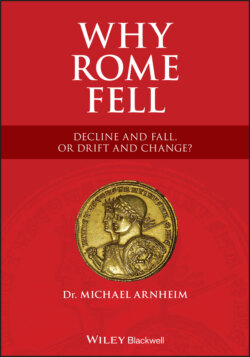Читать книгу Why Rome Fell - Michael Arnheim - Страница 55
“The First Emperor”
ОглавлениеThe section in Mary Beard’s SPQR headed “The first emperor” is not about Augustus or even Julius Caesar, but Pompey. “Pompey,” we read, “…has a good claim to be called the first Roman emperor.” (Beard 2016, p. 273.) We are then treated to a catalogue of the honors and accolades showered upon Pompey. By the middle of the first century BCE, we are told, the stakes and “…the resources of cash and manpower available (were) so much larger that the rise of men such as Pompey was more or less unstoppable.” (Ibid., p. 277.) Beard seems to assume that, had Julius Caesar not got the better of Pompey, he might have ended up in a monarchical role himself. There is very little evidence to back up this assumption. Unlike Caesar, Pompey certainly never identified with any particular political tendency. He was essentially a military man and a very good one too, it would seem. He was essentially an equal opportunity narcissist, happy to accept triumphs, honors, and kudos from any source. But did he really want to rule over Rome as a monarch, and would he even have known what to do had he been placed in that position? Elected consul in 70 BCE, Pompey promised to disband his army after his second triumph, and he kept his word though he could have seized power instead had he so wished. And, when as consul he had to preside over the Senate, such was his ignorance of the procedure that he had to ask a friend to jot down some pointers for his benefit. Much later, in 52 BCE, when he was made sole consul in the Optimate interest, Pompey asked the arch-conservative Cato the Younger to share power with him and advise him, which Cato agreed to do, but only in a private capacity (Plutarch, Pompey, 54; Cato the Younger, 47–49). And Pompey then brought his father-in-law in as his colleague for the last five months of his consulship.
In short, there is really no reason to believe that Pompey was aiming to become the first emperor. But it is not surprising that writers of largely narrative history, with inevitable concentration on individuals, should place undue emphasis on them at the expense of the bigger picture.
An even more egregious example of this tendency than in regard to Pompey is Mary Beard’s similar assumption about the coins issued by the conspirator Marcus Brutus: “The portrayal of a living person on a Roman coin was taken as a sign of autocratic power.” (Beard, p. 295.) In fact, however, as pointed out above, Brutus’s coinage was so replete with traditional republican, aristocratic, and anti-monarchical symbolism as to make it inconceivable that he was aiming at “autocratic power” for himself.
